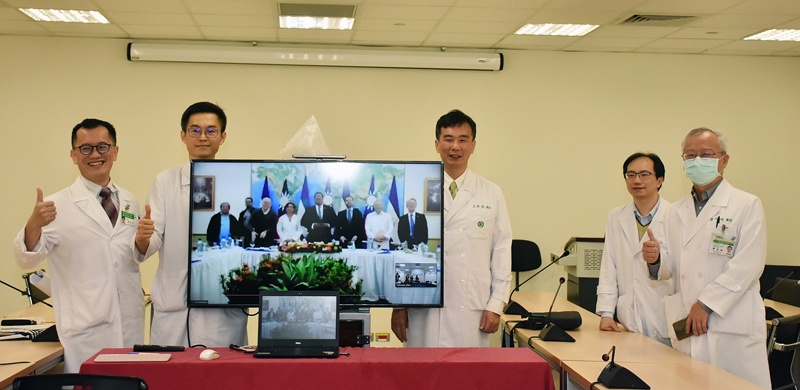05.2020 Group Briefing
Taiwan can help! Far Eastern Memorial Hospital passed on Taiwan's epidemic prevention experience to the friendly nation by teleconference.
Far Eastern Memorial Hospital / Xie Shuhui

Nicaragua, a diplomatic ally of Taiwan, recently linked with Far Eastern Memorial Hospital through the Ministry of Foreign Affairs, and held a video conference with Far Eastern Memorial Hospital on the morning of April 1, Taiwan time. Up to 15 state-level key officials and doctors in the public health sector in Nicaragua, including the President's son, Minister of health, vice chief of the Ministry of foreign affairs, director of natural disaster prevention, director of aviation, director of customs, director of social insurance of Nicaragua, and vice president of Far Eastern Memorial hospital Qiu Guanming and section chief of infection control center Liao Junxing , section chief of the Department of internal medicine, Peng Yusen, section chief of the Department of emergency medicine, Cai Guangchao, section chief of thoracic medicine, Wang binghuai, section chief of the Department of infection, Yang Jiarui and other frontline doctors and experts who lead the hospital's epidemic prevention work responded to the seven major issues raised by Nicaragua.
The meeting was chaired by the vice chief of the Ministry of foreign affairs of Nicaragua, they were especially concerned about how to implement preventive measures against the public. Vice president of Far Eastern Memorial Hospital Qiu Guanming replied, "only a few cases (5 confirmed cases and 1 death) have been confirmed in Nicaragua so far, which is the most important time to control the epidemic. The government's top priority is to ask the people to "stay at home", check and control the "medical resources" of the country, and then "save lives". Vice President Qiu Guanming said that the attitude and measures of the government in implementing the health policy will alert all citizens the seriousness of the epidemic.
Liao Junxing, section chief of Far Eastern Memorial Hospital infection control center, not only briefed on the global epidemic situation, but also introduced in detail the pre-deployed epidemic prevention measures of the government of the Republic of China and Far Eastern Memorial Hospital. Taiwan's epidemic prevention policies, including effective home quarantine, tracking of contacts, and strong advocacy of independent health management, are the key to effective epidemic prevention. He reminded Nicaragua that "wearing masks and washing hands frequently" are an incontrovertible epidemic prevention code, which can effectively prevent the spread of infectious diseases.
Peng Yusen, section chief of the Ministry of internal medicine, is a kidney disease expert himself, and also the main person in charge of “strengthening project of chronic kidney disease prevention and control system” which Far Eastern Memorial Hospital has assisted Nicaragua. He proposed the care and management of chronic kidney patients. Section chief of the Department of infection, Yang Jiarui, aiming at "drugs", provided the current research progress of various countries, especially the "quinine" which has been in the spotlight recently. It is also one of the main drugs used in treatment in Taiwan. Wang binghuai, section chief of thoracic medicine, also answered the precautions of medical staff when caring for patients. He reminded to avoid invasive treatment as much as possible to reduce the chance of infection of medical staff.

The whole video conference lasted for more than one hour, and the whole process was communicated in English. After the representative of Nicaragua finished asking questions, vice chief of the Ministry of foreign affairs, on behalf of the president and vice president of Nicaragua, expressed deep thanks to Far Eastern Memorial Hospital for providing specific measures to assist the country in deepening and popularizing the epidemic prevention work. Wu Jinmu, Taiwan's ambassador to Nicaragua, also thanked the two sides for working together to promote Nicaragua's epidemic prevention through diplomacy.

















